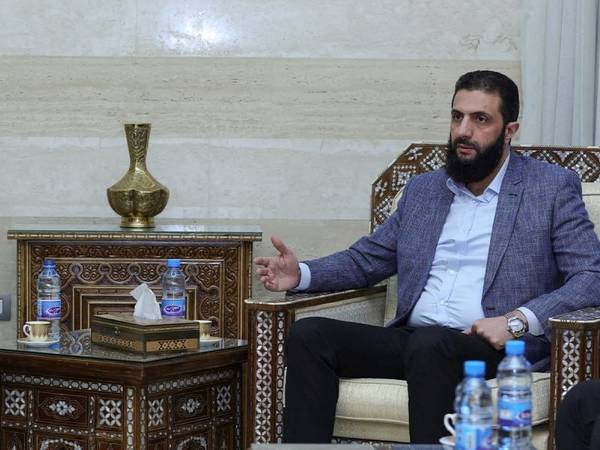Germany and the EU have joined efforts by countries including the US and UK to build relations with Syria’s new ruling Islamist group, Hay'at Tahrir al-Sham (HTS), after the fall of former president Bashar al-Assad.
German diplomats met HTS representatives on Tuesday in Damascus to discuss the transition, according to Germany’s foreign ministry.
"The possibilities of a diplomatic presence in Damascus are also being explored there," read a statement, adding that Berlin is monitoring HTS closely given its roots in al-Qaeda ideology.
"As far as one can tell, they have acted prudently so far," the statement said.
The fall of Assad this month marked the end of 13 years of war, during which around one million refugees have moved to Germany. The country has since paused the asylum procedures as it assesses the new government.
The ministry said that Germany is liaising closely with its partners, including the US, France and Britain, as well as Arab states.
A statement Tuesday said there will be conditions for moving forward.
"The situation remains fragile – the civil war has not only destroyed the country but left deep scars in Syrian society. Millions of people are displaced, the humanitarian situation remains extremely precarious and the danger of fresh violence is omnipresent," the ministry said.
The Federal Foreign Office has drawn up an eight-point plan to support a future Syria, including a greater diplomatic presence and securing and destroying chemical weapons.
"At this time of fragility, it is crucial that Syria does not once again become an arena for international power struggles," added the statement.
On Tuesday, Ann Snow, the UK's special representative for Syria, was seen meeting the HTS leader in Damascus, while US Secretary of State Antony Blinken announced "direct" talks were also ongoing.
Also among those keen to engage the new leadership, Giorgia Meloni, the Prime Minister of Italy, made clear her intentions for the country to build relations moving forward.
"Italy is the only G7 country with an open embassy in Damascus and is ready to engage in dialogue with Syria's new leadership within the framework of joint assessments and actions with European and international partners," she said Wednesday.
The President of the EU Commission, Ursula von der Leyen, speaking in Ankara, said on Wednesday that while the collapse of the Assad government offers new hope to Syrians, there are still great risks.
Standing alongside Turkish President Recap Erdogan at a press conference, she said: "The situation on the ground remains extremely volatile so we are closely monitoring developments ... Europe is ready to do its part to support Syria at this critical junction."
She said their top diplomat is also returning to Damascus, adding that "direct engagement" with HTS and other factions will be next on the agenda, in addition to humanitarian aid and the early recovery of services such as electricity, water and infrastructure. Europe is Syria's biggest donor, with 33 billion euros gathered for the country since 2011, she said.
"Turkey has an essential role in stabilizing the region," she said, speaking directly to President Erdogan, along with a role in the prevention of a resurgence of terrorism.
The statements came as this week, the EU also announced it would be sending an envoy to Damascus for talks with the new interim leadership.
EU foreign policy chief Kaja Kallas said Tuesday that while the EU delegation, which is like an embassy, in Syria was never officially closed, there had not been an accredited ambassador in Damascus during the war.
"We want this delegation to be fully operational again," Kallas said in the European Parliament.
Speaking to reporters on Monday, Kallas said that part of the upcoming EU-Syria discussions will be to sway Damascus from the grip of Iran and Russia.
Directing her message to the new leaders, Kallas said: “Russia and Iran are not your friends, are not helping you if you are in trouble. They left Assad’s regime, and that is a very clear message showing that their hands are full elsewhere and they are weakened.”
As the remnants of the decades-long Assad rule are being swept away, the head of a US-based Syrian advocacy organization said on Monday that a mass grave outside of Damascus contained the bodies of at least 100,000 people killed by the former government.
Mouaz Moustafa of the Syrian Emergency Task Force, said that at al-Qutayfah, 40 km north of the Syrian capital, was one of five mass graves he had identified over the years, hundreds of thousands of Syrians estimated to have been killed since 2011 following Assad’s crackdown on the civil war.
Speaking to Reuters, he said there are fears of US and UK citizens as well as other foreigners being among them. “One hundred thousand is the most conservative estimate. It's a very, very extremely almost unfairly conservative estimate,” he said.
